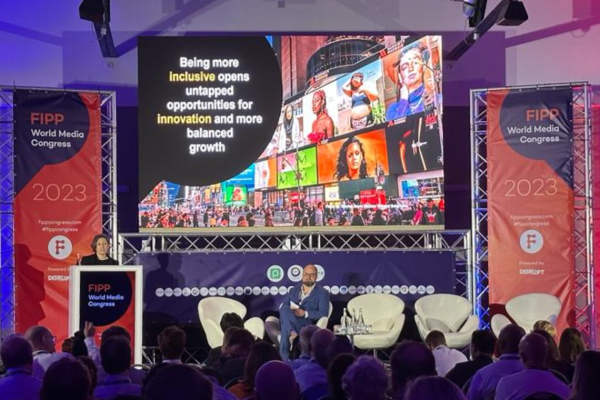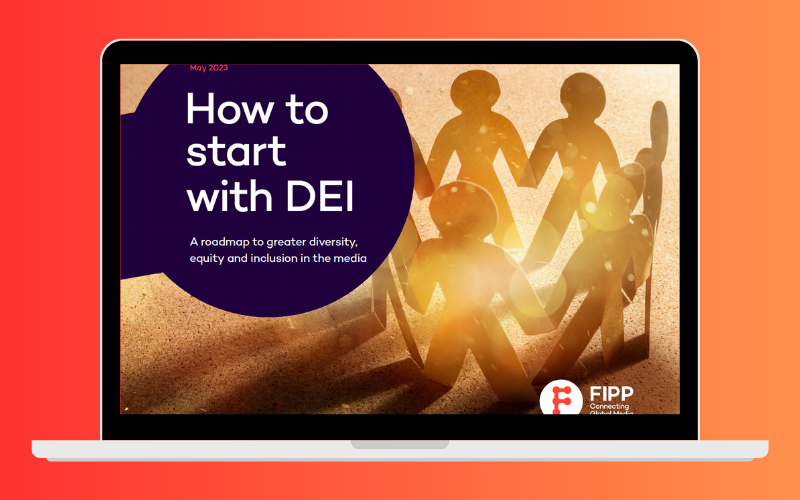FIPP World Media Congress kicks off in Cascais
Attended by more than 400 delegates from 43 countries, the FIPP World Media Congress in the Portuguese town of Cascais kicked off with a look at the state of play of magazine media and the innovation that’s happening in the face of severe disruption.
“A quarter of the way into the 21st century and I think we can agree that so far it’s a time of great crisis, but also a great opportunity,” said FIPP President and CEO James Hewes in his opening address. “The speed at which our industry and the world is changing has never been so rapid.
“One of the things that humans are very bad at is estimating both the impact of change and the rate of change. Change will continue to get quicker and quicker and quicker, and that’s something we need to respond to.”
Touching on what will be one of the hot button topics at the Congress – the threats and opportunities that come with AI – Hewes added: “The existential challenge that might be there from AI, not only to us but to some of the businesses in our ecosystem, we have to think very deeply about how we use it, not only as publishers, but also in the broader environment in which we work.
“It’s clear that we’re all thinking quite deeply about the impact that this technology could have on our world and on our businesses, we’re not treating this like some technologies in the past where we’re just letting it run free. We’re actually having sensible conversations.”
Hewes highlighted the importance of publishers protecting their content. “One of the things that is the lifeblood of our industry is our content and the massive Investment that we make in our content. We protect that content through copyright and in the case of AI, the tools that are out there use what is euphemistically called ‘input data’ – input data to train the model, input data to provide the answers that people ask it for.
“Input data is our content. It originated from work that we did, from the training and years of experience that our journalists have put into their craft and from the investment we’ve made in our technology and that’s something we need to be vigorous in protecting and understanding the extent that if we can get rewarded for the use of that copyrighted material in the training and development of these new tools.
“There is also a danger to the search-based business model that many of us rely on for our advertising businesses. Clearly there is a lot of work to do but it is something we shouldn’t be blind to.”
Hewes said the culmination of the challenges faced by the media meant it was time for “quality publishers to be recognised as quality publishers”.
“The web is not equal. All content is not created the same. We spend an enormous amount of time and money training journalists. We spend an enormous amount of time and money investing in the content that we create and that results in a quality product that our consumers are passionate about.
“We need to do a much better job at selling the virtues of that product and about making people understand the extent to which we invest in that product and journalsm. Only then will be able to get the rewards that come from it.”
Innovation under fire
Welcoming delegates to Cascais, Yulia Boyle, outgoing FIPP Chair and Head of International Media at National Geographic, paid homage to the Ukrainian delegation attending Congress and lauded the country’s e-governance tool DiiA as a shining example of innovation under the most difficult conditions imaginable.
“It’s a true digital revolution unfolding in a country that is being disrupted by a harrowing war,” she said. “I think it demonstrates very well that even amidst a most harrowing disruption that a country can have, or people can have, innovation is still possible, and it lays foundation for the future, despite what’s happening today.”
Giving a progress report on her priorities as FIPP chair, Boyle spoke about the work that has gone into improving representation and inclusive content, increasing member value and highlighting exciting areas of innovation, including magazine publishers partnering with video game companies.
“FIPP is putting so much muscle behind diversity and inclusion, because innovation is one thing, but inclusivity is actually driving innovation and innovation comes from the opportunities that we get from around the world.
“We live in an era of reverse innovation, which means that in 20th century the Western companies thought that innovation starts in the West and that it’s been sold to the developing countries.
“But that assumption was challenged when M-PESA, one of the first mobile banking apps was created in Kenya and then was copied elsewhere around the world. And since that innovation is coming everywhere. That is why we’re putting so much behind inclusion at FIPP in order to bring those practices here to us.”












